A runny nose and sneezing are common symptoms many people experience due to colds, allergies, or irritants in the air. These symptoms, medically known as rhinitis, occur when the nasal lining becomes inflamed, producing excess mucus.
The body responds to this irritation by sneezing to clear the nasal passages. Both conditions can be uncomfortable and disruptive, but they are generally harmless and treatable with home remedies or over-the-counter medications.
Recommended Reading: Allergy Medicine For Kids: Types, Uses, And Side Effects
Best Medicine For Runny Nose And Sneezing (Causes & Treatment)

Table Of Contents
Recommended Reading: Allergy Medicine Dogs: Best Allergy Medicine For Dogs Licking Paws
What Is Runny Nose and Sneezing?
A runny nose and sneezing happen when your nose produces too much mucus, often due to colds, allergies, or irritants like dust or smoke. These reactions help your body clear out anything causing irritation.
How It Works
When something like a virus, allergen, or irritant inflames the lining of your nose, it makes extra mucus to push it out. Sneezing is your body’s way of quickly getting rid of these irritants from your nose.
Causes of Runny Nose and Sneezing
Causes of Runny Nose and Sneezing
Runny nose and sneezing are often caused by colds, allergies, or sinus infections. Other triggers include weather changes, irritants like smoke, and hormonal shifts.
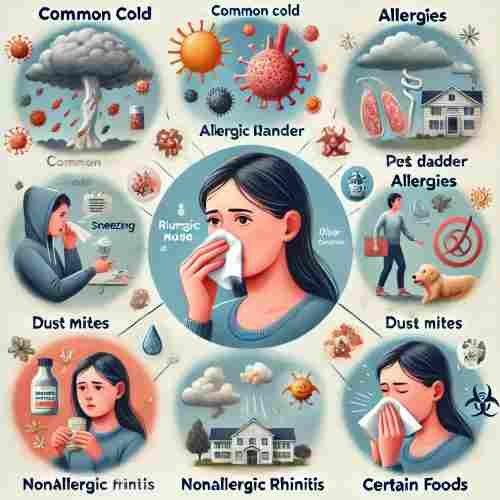
- Common Cold:
- Viral Infection: The common cold is a viral infection that often causes sneezing and a runny nose with clear mucus. It easily spreads through close contact, affecting the nose, throat, and sinuses.
- Allergies (Allergic Rhinitis):
- Allergen Exposure: When exposed to allergens like pollen, pet dander, dust mites, or mold, your body reacts with sneezing, a runny nose, and itchy eyes.
- Nonallergic Rhinitis:
- Environmental Triggers: Unlike allergies, nonallergic rhinitis is caused by factors like pollution, smoke, or strong smells. It leads to nasal congestion and frequent sneezing.
- Other Causes:
- Hormonal Changes: Pregnancy, menstrual cycles, or using birth control can sometimes cause sneezing.
- Weather Changes: Shifts in humidity or temperature can worsen nasal symptoms.
- Certain Foods: Eating spicy foods or drinking alcohol may trigger sneezing in some people.
Recommended Reading: Best Allergy Medicine For Cats: Types, Uses, & Side Effects
Best Treatment For Runny Nose And Sneezing
Best Treatment For Runny Nose And Sneezing
The best treatments for neezing include antihistamines, decongestants, and saline nasal sprays. Home remedies like steam inhalation and staying hydrated also help.
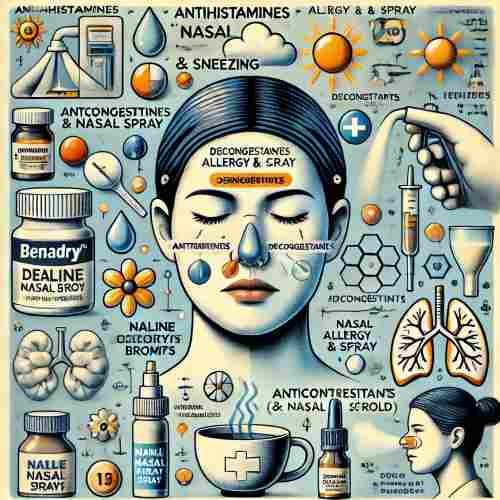
- Antihistamines
- How They Work: Block histamine, a chemical released during allergic reactions, reducing sneezing and runny nose.
- Forms: Available as pills, liquids, eye drops, nasal sprays, and inhalers.
- Examples: Actifed Cold, Benadryl Allergy & Cold.
- Decongestants
- How They Work: Relieve congestion in the nose and sinuses, making it easier to breathe.
- Forms: Available as pills, liquids, or nasal sprays.
- Caution: Should not be used for more than a few days to avoid rebound congestion.
- Saline Nasal Drops
- How They Work: Moisturize nasal passages and clear out mucus naturally.
- Use: Safe for all ages, including babies.
- Nasal Corticosteroids
- How They Work: Reduce inflammation in the nasal passages, helping with chronic symptoms.
- Examples: Fluticasone and mometasone.
- Nasal Irrigation (Neti Pot)
- How It Works: Flushes out allergens and irritants from the nose with a saline solution.
- How It Helps: Drinking plenty of fluids thins mucus, making it easier to clear.
- Allergen Immunotherapy
- How It Works: Helps your body build tolerance to allergens over time.
- Humidifier
- How It Helps: Adding moisture to the air prevents nasal passages from drying out.
- Steam Inhalation
- How It Works: Helps loosen mucus and clear nasal congestion.
- Antileukotriene
- How They Work: Block leukotrienes, chemicals that cause inflammation in the nose.
- Nasal Decongestant Sprays
- How They Work: Shrink swollen blood vessels in the nasal passages, providing immediate relief.
- Cough Suppressants
- How They Work: Help reduce cough caused by postnasal drip.
- Warm Compress
- How It Helps: Applying a warm, moist washcloth to your face can relieve discomfort from sinus pressure.
- Ipratropium Bromide
- How It Works: Reduces nasal secretion and helps treat runny nose, especially in non-allergic rhinitis.
- Immunotherapy
- How It Works: Involves allergy shots or tablets to build resistance against specific allergens.
- Home Remedies
- Rest: Allowing your body to heal by getting plenty of sleep.
- Steam: Inhaling steam from a shower or using a humidifier can relieve symptoms.
- Warm Fluids: Drinking warm liquids helps soothe the throat and thin mucus.
- Saline Spray: Helps clear nasal passages and moisturizes the inside of the nose.
How Antihistamines Stop Runny Nose and Sneezing?
How Antihistamines Stop Runny Nose and Sneezing?
Antihistamines block the effects of histamine, a chemical that triggers allergy symptoms like sneezing. This helps reduce nasal congestion and irritation.

What Are Antihistamines?
Antihistamines are medications used to treat allergy symptoms. They work by blocking histamine, a chemical released by the body during an allergic reaction. Histamine is responsible for causing symptoms like a runny nose, sneezing, and itching.
How They Work
Antihistamines reduce the effects of histamine in your body. By blocking histamine receptors, these medications prevent the body from reacting to allergens like pollen, dust, or pet dander, which helps stop sneezing and nasal discharge.
Types of Antihistamines
There are two main types:
- First-generation antihistamines (e.g., diphenhydramine) may cause drowsiness.
- Second-generation antihistamines (e.g., loratadine, cetirizine) are less likely to make you feel sleepy and are often preferred for long-term use.
When to Use
Antihistamines are effective for treating allergies and can be taken before exposure to allergens or at the onset of symptoms to reduce sneezing.
Recommended Reading: Anti Allergy Medicine For Skin Itching (Uses & Side Effects)
7 Best Anti Allergy Tablets in Pakistan for Quick Relief
| Medicine (Generic Name) | Brand Examples | Best For | Key Benefits | Common Side Effects / Notes |
|---|---|---|---|---|
| Cetirizine | Zyrtec | Allergies: sneezing, runny nose | Fast-acting, 24-hour relief, effective for persistent symptoms | Mild drowsiness in some people |
| Loratadine | Claritin | Allergies: sneezing, runny nose | Non-drowsy, long-lasting | Very few side effects, good for daytime use |
| Fexofenadine | Allegra | Allergies: sneezing, runny nose | Non-drowsy, strong for seasonal allergies | Generally well-tolerated |
| Fluticasone (nasal spray) | Flonase | Allergies: sneezing, runny nose, congestion | Reduces inflammation long-term | Best with regular use; may take days to fully work |
| Diphenhydramine | Benadryl | Runny nose, sneezing (cold/allergy) | Fast relief, dries mucus quickly | Causes drowsiness; better at night |
| Pseudoephedrine | Sudafed | Congestion + runny nose | Strong decongestant | Can raise blood pressure; sold behind counter |
| Triamcinolone (nasal spray) | Nasacort | Allergies: sneezing, runny nose | Steroid spray, reduces nasal inflammation | Similar to Flonase; non-drowsy |
| Levocetirizine | Xyzal | Allergies: sneezing, runny nose | Potent, 24-hour non-drowsy option | Similar to cetirizine |
| Oxymetazoline (nasal spray) | Afrin, Vicks Sinex | Quick relief for runny/congested nose | Fast-acting (minutes) | Limit to 3 days to avoid rebound congestion |
| Combination (e.g., Loratadine + Pseudoephedrine) | Claritin-D | Allergies + congestion/runny nose | Dual action (antihistamine + decongestant) | Non-drowsy; good for mixed symptoms |
Top 10 Best Antihistamines For Runny Nose
| Antihistamine Name | Type | Common Uses | Drowsiness |
|---|---|---|---|
| Loratadine | Second-generation | Allergies (hay fever, hives) | Low |
| Cetirizine | Second-generation | Allergies, chronic hives | Low to Moderate |
| Fexofenadine | Second-generation | Seasonal allergies, hives | Low |
| Diphenhydramine | First-generation | Allergies, insomnia, motion sickness | High |
| Chlorpheniramine | First-generation | Allergy relief | High |
| Levocetirizine | Second-generation | Chronic allergies, hives | Low to Moderate |
| Desloratadine | Second-generation | Allergies (hay fever, hives) | Low |
| Azelastine (Nasal Spray) | Nasal antihistamine | Allergic rhinitis, nasal congestion | Low |
| Meclizine | First-generation | Motion sickness, vertigo | Moderate |
| Hydroxyzine | First-generation | Allergies, anxiety, nausea | High |
Top 10 Best Tablets For Runny Nose
Best Tablets For Sneezing
Tablets like antihistamines and decongestants, such as Cetirizine and Pseudoephedrine, help relieve runny nose and congestion. They reduce symptoms by controlling allergic reactions and clearing nasal passages
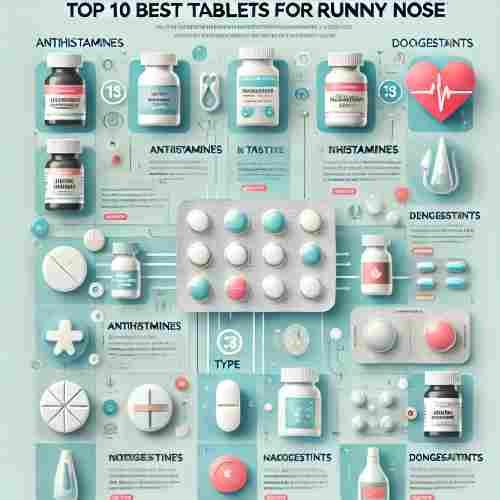
| Tablet Name | Type | Usage | Drowsiness |
|---|---|---|---|
| Loratadine | Antihistamine | Relieves allergy symptoms like sneezing | Low |
| Cetirizine | Antihistamine | Helps with seasonal allergies, itching, and sneezing | Moderate |
| Fexofenadine | Antihistamine | Treats hay fever and other allergy symptoms | Non-drowsy |
| Desloratadine | Antihistamine | Reduces nasal congestion and sneezing | Low |
| Levocetirizine | Antihistamine | Provides relief from allergic rhinitis symptoms | Moderate |
| Chlorpheniramine Maleate | Antihistamine | Reduces sneezing and runny nose from allergies | High |
| Pseudoephedrine | Decongestant | Treats nasal congestion due to colds/allergies | Non-drowsy |
| Phenylephrine | Decongestant | Reduces nasal congestion, clears stuffy nose | Non-drowsy |
| Loratadine + Pseudoephedrine | Combination Tablet | Relieves sneezing, runny nose, and congestion | Low |
| Cetirizine + Pseudoephedrine | Combination Tablet | Dual action for sneezing and nasal blockage | Moderate |
Recommended Reading: Best Allergy Medicine For Kids
Top 10 Best Syrups For Runny Nose
Best Syrups For Runny Nose
Syrups like Benadryl and Zyrtec can help reduce sneezing by relieving allergy symptoms and congestion. They soothe nasal irritation and ease mucus buildup.
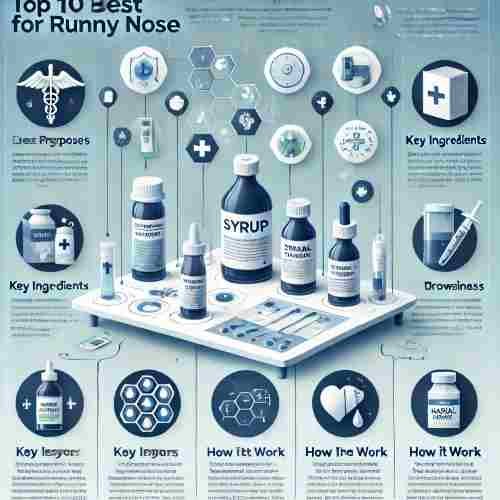
| Syrup Name | Purpose | Key Ingredient | How it Works | Drowsiness |
|---|---|---|---|---|
| Benadryl Syrup | Allergy and cold relief | Diphenhydramine | Reduces sneezing, and itching | May cause drowsiness |
| Allercet Syrup | Allergy symptom relief | Cetirizine | Reduces sneezing, nasal discharge, and irritation | Low risk |
| Tixylix Syrup | Cold and allergy relief | Antihistamine | Reduces nasal congestion and sneezing | Mild drowsiness |
| Actifed Syrup | Cold and nasal congestion relief | Triprolidine, Pseudoephedrine | Clears blocked nose and reduces sneezing | Moderate drowsiness |
| Piriton Syrup | Allergy relief | Chlorpheniramine | Reduces sneezing, and itching | Can cause drowsiness |
| Zyrtec Syrup | Allergy symptom relief | Cetirizine | Reduces sneezing, runny nose, and itching | Non-drowsy |
| Cofcol Syrup | Cold and nasal congestion relief | Phenylephrine | Clears blocked nose, reduces sneezing | Non-drowsy |
| Claritin Syrup | Allergy symptom relief | Loratadine | Reduces sneezing, and irritation | Non-drowsy |
| Polaramine Syrup | Allergy relief | Dexchlorpheniramine | Treats runny nose and sneezing | High chance of drowsiness |
| Dimetapp Syrup | Cold and allergy relief | Brompheniramine, Phenylephrine | Combines decongestant and antihistamine | May cause drowsiness |
Top 10 Best Creams For Runny Nose
Best Creams For Runny Nose
Creams like Vaseline or Aquaphor can help soothe irritation around the nose caused by frequent wiping due to a runny nose. They provide moisture and protect the skin from dryness.

| Cream Name | Purpose | Key Ingredient | How it Works | Application |
|---|---|---|---|---|
| Vicks VapoRub | Relief for congestion and cold | Menthol, Camphor, Eucalyptus | Helps open nasal passages and soothe irritation | Apply on chest and neck |
| Tiger Balm | Cold and nasal congestion relief | Menthol, Camphor | Provides a cooling sensation and clears nasal blockage | Rub on chest or nose |
| Mentholatum Ointment | Nasal congestion relief | Menthol, Petrolatum | Soothes irritated nasal area and reduces congestion | Apply on nostrils |
| Nasalguard Allergy Block | Prevents allergy-related sneezing | Gel base with active blockers | Blocks allergens from entering nasal passages | Apply around nostrils |
| Zarbee’s Soothing Chest Rub | Eases cold and nasal irritation | Eucalyptus, Lavender, Beeswax | Helps open airways and relieve nasal discomfort | Rub on chest |
| Himalaya Cold Balm | Natural cold relief | Eucalyptus, Camphor, Mint | Helps reduce nasal congestion and relieve irritation | Rub on chest and throat |
| Amrutanjan Cold Balm | Congestion and cold symptom relief | Menthol, Camphor, Eucalyptus | Clears stuffy nose and soothes chest congestion | Rub on nose or chest |
| Olbas Inhaler Balm | Congestion and cold relief | Essential oils (Peppermint, Eucalyptus) | Opens up nasal passages for easier breathing | Apply under nostrils |
| Karvol Plus Balm | Relieves cold symptoms | Essential oils blend | Clears nasal blockages and eases breathing discomfort | Rub on chest and neck |
| Deep Heat Rub | Relieves cold-induced nasal issues | Menthol, Eucalyptus | Eases muscle stiffness and nasal congestion during colds | Apply on chest or nose |
Recommended Reading: Allergy Medicine Dogs: Best Allergy Medicine For Dogs Licking Paws
Best Home Remedies For Runny Nose
| Home Remedy | How It Helps | How to Use |
|---|---|---|
| Steam Inhalation | Clears nasal passages and reduces congestion | Inhale steam from hot water with a towel over your head |
| Saline Nasal Spray | Moisturizes nasal passages and clears mucus | Spray saline solution into each nostril several times a day |
| Honey and Warm Water | Soothes throat irritation and reduces sneezing | Mix 1-2 teaspoons of honey in warm water and drink |
| Ginger Tea | Has anti-inflammatory properties and eases symptoms | Boil fresh ginger in water and drink it as tea |
| Peppermint Oil | Opens up nasal passages and relieves congestion | Inhale peppermint oil by adding a few drops to a diffuser |
| Turmeric Milk | Boosts immunity and soothes irritation | Mix turmeric powder in warm milk and drink before bed |
| Stay Hydrated | Helps thin mucus and reduces congestion | Drink plenty of water, herbal teas, or clear broths |
| Vitamin C | Strengthens immune system and reduces cold symptoms | Eat fruits rich in vitamin C like oranges and kiwis |
| Garlic | Acts as a natural antiviral and decongestant | Chew raw garlic or add it to soups and broths |
| Eucalyptus Oil | Clears blocked nasal passages and soothes breathing | Add a few drops of eucalyptus oil to a steam inhaler or warm water |
Top 10 Nasal Sprays For Runny Nose
Top 10 Nasal Sprays For Runny Nose
Nasal sprays, such as saline or decongestant sprays, help clear nasal congestion and reduce runny nose symptoms. They work by moisturizing or shrinking swollen nasal passages.
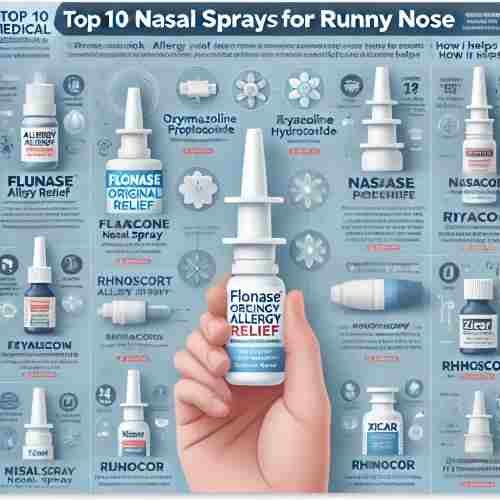
| Nasal Spray | How It Helps | Key Ingredient |
|---|---|---|
| Flonase Allergy Relief | Reduces sneezing, runny nose, and congestion | Fluticasone Propionate |
| Nasacort Allergy 24HR | Relieves allergy symptoms like sneezing and runny nose | Triamcinolone Acetonide |
| Afrin Original Nasal Spray | Provides quick relief from nasal congestion | Oxymetazoline Hydrochloride |
| Zicam Allergy Relief | Eases sneezing and clears nasal passages | Oxymetazoline Hydrochloride |
| Rhinocort Allergy Spray | Treats nasal allergy symptoms like sneezing | Budesonide |
| Xlear Nasal Spray | Soothes nasal irritation and clears mucus | Xylitol and Saline |
| Fluticare Nasal Spray | Helps with runny nose and sneezing | Fluticasone Propionate |
| Nasonex 24HR Allergy | Long-lasting relief from sneezing and congestion | Mometasone Furoate |
| Little Remedies Saline Spray | Clears stuffy nose and moisturizes nasal passages | Saline Solution |
| Simply Saline Nasal Mist | Flushes out irritants and soothes nasal congestion | Sterile Saline |
Top 10 Best Decongestants For Runny Nose
| Decongestant | How It Helps | Key Ingredient |
|---|---|---|
| Sudafed PE | Reduces nasal congestion and runny nose | Phenylephrine |
| Afrin Nasal Spray | Provides quick relief from congestion and runny nose | Oxymetazoline |
| Mucinex Sinus-Max | Clears nasal congestion and reduces mucus buildup | Guaifenesin + Phenylephrine |
| Vicks Sinex Severe | Eases nasal congestion and sinus pressure | Oxymetazoline |
| Claritin-D | Relieves allergy symptoms and clears a stuffy nose | Loratadine + Pseudoephedrine |
| Allegra-D | Reduces sneezing, runny nose, and congestion | Fexofenadine + Pseudoephedrine |
| Zyrtec-D | Provides relief from allergy symptoms and nasal congestion | Cetirizine + Pseudoephedrine |
| Tylenol Sinus + Headache | Eases sinus congestion and pressure | Acetaminophen + Phenylephrine |
| Robitussin Severe Congestion | Helps with chest congestion and runny nose | Guaifenesin + Phenylephrine |
| Breathe Right Nasal Strips | Opens nasal passages and improves breathing | Non-medicated adhesive strips |
Recommended Reading: Best Allergy Medicine For Dogs Licking Paws
Top 10 Best Saline For Runny Nose
Best Saline For Runny Nose
Saline solutions help clear a runny nose by gently flushing out mucus and allergens, providing relief. They are safe, non-medicated, and ideal for regular use.
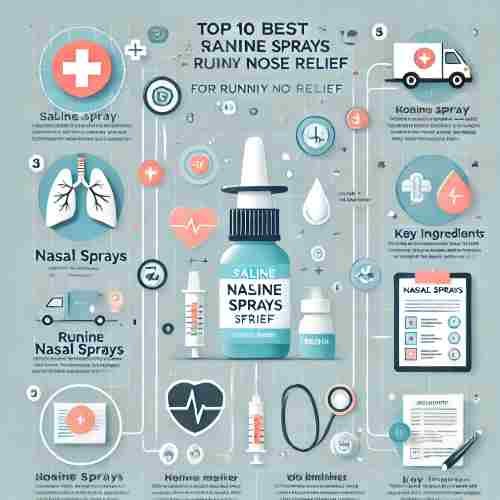
| Saline Nasal Spray | How It Helps | Main Ingredient |
|---|---|---|
| Ayr Saline Nasal Spray | Moisturizes dry nasal passages and clears mucus | Sodium Chloride |
| Simply Saline Nasal Mist | Clears nasal congestion and soothes irritation | 100% Pure Salt & Water |
| Ocean Saline Nasal Spray | Helps with dry nose and congestion relief | Sodium Chloride Solution |
| Arm & Hammer Simply Saline | Gently clears mucus and hydrates nasal passages | Sterile Saline |
| Little Remedies Saline | Safe for babies to relieve stuffy nose | Sterile Saline Solution |
| NeilMed NasaMist | Provides instant relief from congestion and dryness | Buffered Saline |
| Xlear Nasal Spray | Contains xylitol to soothe and protect nasal passages | Xylitol & Saline |
| Vicks Sinex Saline | Helps loosen mucus and relieve dryness | Saline Solution |
| NasalCrom Nasal Spray | Prevents allergic reactions causing sneezing | Sodium Chloride |
| SinuCleanse Saline Spray | Hydrates nasal passages and flushes out irritants | Saline Solution |
Symptoms of Runny Nose and Sneezing
Key Symptoms
- Nasal Discharge: You may notice clear or colored mucus coming from your nose.
- Itchy Nose and Watery Eyes: Often happens with allergies, making you feel uncomfortable.
- Postnasal Drip: Mucus can drip down your throat, causing irritation.
- Sneezing: A natural reflex to help clear out irritants from your nose.
Other Symptoms
- Facial Pain: Especially if you have sinusitis, you might feel pain around your face.
- Sore Throat or Cough: Caused by the mucus from postnasal drip.
- Loss of Taste or Smell: You might notice that your sense of taste or smell is not as sharp.
Side Effects of Runny Nose and Sneezing
- Colds:
- Common Symptoms: Colds often cause nasal congestion, sneezing, and a sore throat. The infection can also spread to the throat or chest, making breathing uncomfortable.
- Allergies:
- Allergic Reactions: Allergies usually result in sneezing, a runny or blocked nose, and itchy eyes. Some people experience these symptoms during certain seasons, while others may have them all year round.
- Sinus Infections:
- Sinus Inflammation: When the sinus tissues become inflamed, it can lead to a runny or stuffy nose and cause facial pain or pressure.
- Other Complications:
- Postnasal Drip: Excess mucus can drip down the throat, causing soreness and a persistent cough.
- Ear Pain: Mucus buildup may lead to ear discomfort or even ear infections in some cases.
Recommended Reading: Best Allergy Medicine For Cats: Types, Uses, & Side Effects
FAQs
What causes a runny nose and sneezing?
A runny nose and sneezing are usually caused by colds, allergies, or sinus infections. Your body produces extra mucus to trap irritants like viruses, allergens, or bacteria, which leads to these symptoms.
How can antihistamines help with runny nose and sneezing?
Antihistamines work by blocking the effects of histamine, a chemical in your body that triggers allergy symptoms like sneezing and a runny nose. They are especially helpful for people who suffer from allergies.
Are decongestants safe for treating runny nose?
Decongestants can provide quick relief from a stuffy nose, but they should not be used for more than a few days. Overuse of nasal decongestant sprays can lead to rebound congestion, which can worsen the symptoms.
Can home remedies really help with a runny nose and sneezing?
Yes, home remedies like staying hydrated, inhaling steam, using a saline nasal spray, and resting can help manage mild symptoms.
What is the best over-the-counter treatment for runny nose and sneezing?
Antihistamines and decongestants are the most commonly used over-the-counter treatments. Examples include Benadryl, Zyrtec, and Sudafed for quick relief from symptoms.
Can a humidifier help with a runny nose?
Yes, using a humidifier adds moisture to the air, which can help keep your nasal passages from drying out and relieve congestion.
How does a saline nasal spray help with sneezing and a runny nose?
Saline nasal sprays help rinse the nasal passages, remove irritants, and moisturize the nasal tissues, providing relief from a runny nose and sneezing.
Are there long-term treatments for allergies causing runny nose and sneezing?
Yes, allergen immunotherapy, such as allergy shots or tablets, can help your body become less sensitive to allergens over time.
Conclusion
Recommended Reading: Allergy Medicine Dogs: Best Allergy Medicine For Dogs Licking Paws
Summary
A runny nose and sneezing are common signs of colds, allergies, or sinus infections. These symptoms can often be managed with over-the-counter treatments such as antihistamines or decongestants. Simple home remedies like staying hydrated, using steam, and saline nasal sprays can also help ease discomfort.
Final Recommendation
If symptoms last for a long time or become severe, it’s important to see a healthcare professional to check for any underlying issues and get the right treatment.
Disclaimer
Commissions we earn from partner links on this page do not influence our content. Our editorial content is based on thorough research and insights from qualified medical professionals to ensure the highest standards of accuracy and reliability.
Information provided on Doseway is for educational purposes only. Your health and wellness are unique to you, and the products and services we review may not be suitable for your individual circumstances. We do not offer personal medical advice, diagnosis, or treatment plans. For specific advice, please consult with a healthcare professional. Doseway adheres to strict editorial integrity standards. To the best of our knowledge, all content is accurate as of the date posted, though offers and information may change. The opinions expressed are the author’s own and have not been influenced, approved, or endorsed by our partners.

 Cart is empty
Cart is empty
Add a Comment